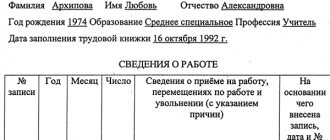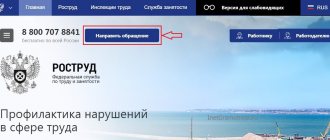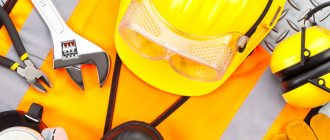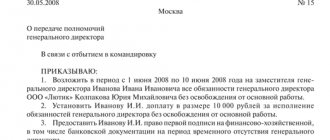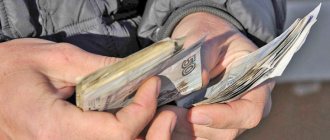Instruction 1: types of inspections and timing of their implementation
All GIT inspections are divided into 2 groups: scheduled and unscheduled. Unscheduled inspections do not have a specific frequency. If the State Labor Inspectorate receives a signal that your company is violating labor laws, an inspector can visit you at any time. We will tell you more about who can provoke the sudden arrival of a GIT inspector and for what reasons.
As for scheduled inspections, everything is regulated here: the labor inspectorate conducts them more often, the higher the risk category assigned to the employer (Article 8.1 of the Law of December 26, 2008 No. 293-FZ “On Amendments...”):
Time frame for GIT verification
According to the new Regulations, in 2021 the period for checking the GIT is 20 days.
If the enterprise has branches or other representative offices, then the deadlines can be extended to a maximum of 60 days (clause 4 of the Regulations). The decision to extend the inspection is made by the inspection management.
It is worth noting that the inspection time is calculated based on the time directly spent by inspectors at the enterprise. And the time for drawing up documents is not included in these deadlines.
Instruction 2: how can an employer find out the risk category assigned to him?
A company (IP) has several ways to find out the risk category assigned to the GIT:
- Method 1. Contact the GIT with a request.
Any employer has the right to contact its regional labor inspectorate with a request about the assigned risk category and receive a response within a period not exceeding 15 working days from the date of receipt of the request (clause 13 of the Rules, approved by Decree of the Government of the Russian Federation of August 17, 2016 No. 806).
- Method 2. Calculate yourself.
The technology for determining the risk category for a specific employer is described in detail in the Rules, approved. Resolution No. 806.
The “online risk category calculator” service on the Rostrud website will help simplify calculations and save time.
- Method 3. Find out on the Rostrud website.
This method is the simplest - look at the official website of Rostrud and get the necessary information without any queries or calculations. But it is not suitable for all employers.
The point is this: Rostrud is obliged to post on its official website only information that the employer is classified as a high or significant risk (clause 12 of the Rules, approved by Resolution No. 806). This information must be posted on the website before July 1 of the year preceding the year of scheduled inspections.
If your company is assigned to other risk categories, you will not find information about this on the website.
Is it possible to somehow influence the assigned risk category and reduce the frequency of scheduled GIT inspections for your company? More on this in instructions No. 3.
What does the State Tax Inspectorate check during a routine inspection?
The supervisory activities of the labor inspectorate are aimed at detecting any violations of labor legislation and bringing those responsible for them to justice. For this purpose, the law specifically provides for such a form of supervision as conducting scheduled and unscheduled inspections (Article 356 of the Labor Code of the Russian Federation).
Methodological recommendations (subclause 2.6, clause 2) highlight comprehensive and thematic scheduled inspections of GIT. The subject of the first is compliance with labor legislation in general (for the main institutions of labor law). Thematic audits may relate to a specific aspect of the employment relationship, for example:
- their proper registration;
- wages;
- concluding a collective agreement;
- working time and rest time;
- providing guarantees and compensation;
- provision of personal protective equipment;
- registration and investigation of industrial accidents;
- respect for women's labor rights, etc.
In practice, the plans indicate “compliance with labor and labor protection legislation” as the purpose of the inspection. It is hardly possible to predict in advance what exactly inspectors will be interested in.
The State Tax Inspectorate also has the right to verify compliance with orders to eliminate violations and take measures to prevent them, issued based on the results of previously conducted inspections.
The employer's compliance with the terms of local regulations (LNA), collective and labor agreements is not directly included in the subject of GIT inspections. But the obligation to fulfill them is established in Part 2 of Art. 22 Labor Code of the Russian Federation. Therefore, checks are carried out in this part as well.
Instruction 3: how to reduce the risk category so that there are fewer inspections
If the employer does not agree with the risk category assigned to him, he has the right to submit an application to the State Tax Inspectorate to change it. Our drawing will explain what to include in the application and within what time frame it will be considered:
What a decision to change a previously assigned risk category to a lower one looks like, see here.
Before you contact the State Tax Inspectorate to reduce your risk category, assess how realistic your requests are. Just the desire to reduce the number of scheduled labor inspections for your company is clearly not enough.
First of all, look at the following indicators:
- presence of accidents;
- facts of salary arrears;
- existing administrative penalties.
Data on injuries and previously identified violations are taken for the 3 years preceding the current one. And information about salary arrears is used for the current year.
Instruction 4: how to find out the date of the scheduled GIT inspection
The employer can find out the date of arrival of the State Inspectorate for conducting a scheduled inspection long before the start of this event. To do this, you do not need to visit inspectors or call them on the phone. The schedule of inspections for the next period is published by the territorial inspectorates of the State Labor Inspectorate on the official website of Rostrud in the public domain:
Information with company names and inspection dates is presented in a separate XL file. It can be freely downloaded from the website. In addition, territorial State Tax Inspectorates are required to warn employers about the upcoming arrival of inspectors, including by posting on the website notifications about planned scheduled inspections for specific companies and individual entrepreneurs.
On-site inspection of GIT
If the inspection is planned, then it is often on-site. The duties of the inspection include mandatory notification of the employer at least 3 working days before the inspection.
A notification is considered to be a copy of the order (order) sent in one of the following ways:
- by registered mail with acknowledgment of delivery;
- by email to the official address of the company;
- other available method of sending a letter.
The inspection notification must indicate the numbers of the checklists that will be used for inspection, from Order of Rostrud No. 655 of November 10, 2017.
Instruction 5: routine inspection scheme
All scheduled GIT inspections are carried out according to a single procedure, presented in the diagram:
The law does not regulate what documents an inspector may request during an inspection. Usually these are employment contracts, work books and registers of their accounting, personal files and personal cards of employees, time sheets, staffing schedules, vacation schedules, pay slips, payroll records, internal labor regulations, collective agreements and other local acts, etc. documentation.
During an inspection, the inspector does not have the right to seize original documents and demand that information and papers not related to the topic of the inspection be provided to him. The law does not allow him to check more than what is provided in the checklists.
All restrictions that are imposed on the inspector during the inspection are listed in Art. 15 of the Law of December 26, 2008 No. 294-FZ “On the protection of the rights of legal entities and individual entrepreneurs...”.
Duration of inspections
If verification takes too long, it hurts business. To protect enterprises from losses due to the sluggishness of inspection authorities, legislation has introduced restrictions. Now the inspection cannot last more than 20 working days (Article 13 No. 294 of the Federal Law). Small businesses can be inspected for no more than 50 hours per year. For micro-enterprises there is a limit of 15 hours per year.
For enterprises with branches in several constituent entities of the Russian Federation, the law establishes an inspection period of no more than 60 working days (clauses 24 and 62 of the Regulations and part 4 of Article 13 No. 294-FZ).
If the inspection requires lengthy investigations, examinations and tests, the period for its completion can be increased by no more than 2 times (clause 24 of the Regulations). Unscheduled inspections cannot last more than 20 days (clause 107 of the Regulations).
Instruction 6: how can an employer check himself before the arrival of a GIT inspector?
Each employer can conduct a self-inspection before the arrival of a labor inspector.
And again, modern technologies come to the rescue ─ on the Rostrud website you will find a free service “Electronic Inspector”, with the help of which any employer can find out whether there are violations of labor laws at his enterprise:
The service includes 200 self-test sheets, after filling which the system will give you a conclusion about the presence or absence of violations.
The system allows, based on data on specific employees, to test the correctness of the employment process, the provision of paid annual leave, assess the legality and compliance by the employer with the procedure for imposing financial liability on the employee, etc.
More than 500,000 employers have already used the service, and the violations they identified helped them protect themselves from fines totaling RUB 10.8 billion.
Here are the most frequently detected violations:
| No. _ _ _ | Type of violation | Link to Labor Code of the Russian Federation |
| 1 | Employees are not familiar with internal local regulations related to their work activities | Part 2 Art. 22, part 3 art. 68 |
| 2 | The internal labor regulations and employment contracts do not indicate the days of payment of wages | part 6 art. 136 |
| 3 | The employer has not developed a procedure for indexing wages | Art. 134 |
| 4 | Employment contracts do not contain the necessary information and conditions (place of work, conditions of remuneration, etc.) | Part 1 and Art. 57 |
| 5 | The employment contract incorrectly states the place of work of an employee of a separate division | para. 2 hours 2 tbsp. 57 |
| 6 | The employment contract does not indicate the employee's salary | Art. 57 |
| 7 | The vacation schedule was approved later than 2 weeks before the new calendar year for which it was drawn up | Part 1 Art. 123 |
| 8 | The employee's vacation is divided into parts, each of which is less than 14 days | Art. 125 |
| 9 | A pregnant employee is subject to a probationary period during employment. | Part 4 Art. 70 |
| 10 | A minor employee is entitled to an annual paid leave of 28 calendar days. | Art. 267 |
| 11 | Employees are not notified in a timely manner about the start of vacation | Part 3 Art. 123 |
| 12 | Employees' working hours are not recorded in timesheets | Art. 91 |
| 13 | A civil law contract was concluded instead of an employment contract | Art. 57 |
| 14 | The form of the pay slip has not been approved | Part 1 Art. 136 |
| 15 | There are no employee signatures on personal cards and employment contracts | Art. 67 |
GIT inspection report
Upon completion of the inspection, the organization receives the following documents:
- An act indicating the objects of inspection.
- An order describing the identified violations and the time frame for their elimination.
If during the inspection some of the violations were eliminated, they are still included in the Order with a note about their elimination. The deadline for sending the Certificate to the employer is 3 working days. You can receive the document immediately at the inspection site against a signature or at the inspection. In case of refusal to receive the Certificate by representatives of the enterprise, the document is sent to the organization by registered mail with notification within three working days.
The deadline for receiving the Order is 3 working days after the transfer of the Certificate, if the documents are not issued on the spot immediately after the inspection.
If the organization does not manage to eliminate the violations on time, then it is possible to submit a request to the labor inspectorate to extend this period.
The new version of the Regulations establishes the time for filing a request for an extension - no later than 5 working days before the end of the deadline for fulfilling the order. The request must indicate the reasons for the need for an extension and attach documents about the violations that have already been eliminated. Based on the data received, the inspection will decide whether or not to extend the deadline for eliminating violations.
Instruction 7: how to reduce the risks of sudden inspections of the State Tax Inspectorate
A GIT inspector may appear in a company outside of the plan. Such visits are called unscheduled inspections: the inspector must notify the employer of his arrival 24 hours before his appearance. Except for the cases specified in Art. 306 of the Labor Code of the Russian Federation, when advance notification of a surprise inspection is prohibited.
Unscheduled control measures are carried out upon receipt of a signal about possible violations of labor legislation requirements or in order to monitor the execution of previously issued orders to eliminate violations (if the period for their elimination has expired).
Who can provoke an unscheduled inspection of the GIT?
The employer himself
You yourself may become the reason for the sudden arrival of a labor inspector if, for example, you do not carry out a special assessment on time or submit a declaration based on its results late.
Example 1
In September 2021, the state labor inspector of the territorial inspection of the State Labor Inspectorate for the Republic of Tatarstan carried out an unscheduled documentary inspection of the Kazan employer due to violation of the deadline for filing a declaration based on the results of a special labor assessment (clause 5 of Order of the Ministry of Labor of Russia dated 02/07/2014 No. 80n). As a result, both the company and the manager were brought to administrative liability under clause 2 of Art. 5.27.1 Code of Administrative Offenses of the Russian Federation.
Let us remind you that the punishment under this standard is: a warning or fine for officials and individual entrepreneurs from 5,000 to 10,000 rubles, for a company ─ from 60,000 to 80,000 rubles.
Your employees
The reason for a surprise inspection in most cases is a complaint from an employee of your company. There may be plenty of reasons for complaints - they did not pay extra for harmful working conditions, did not provide the required personal protective equipment, delayed wages or violated some other point of labor legislation.
Example 2
In September 2021, a surprise inspection was carried out by the territorial body of Rostrud in the Vladimir region at the request of an employee of a joint-stock company, during which the employer’s debt was established in the amount of 1 million 345 thousand rubles. in front of 149 employees. After the measures were taken, the salary debt was repaid in full, and the employer was brought to administrative responsibility.
Or another typical case.
Example 3
At the State Tax Inspectorate for the Republic of Tatarstan, a bulldozer driver complained that the employer did not provide him with the required rubber boots as part of his personal protective equipment. During an unscheduled inspection, the employer revealed many violations, including those not related to the provision of personal protective equipment to employees: incomplete completion of personal cards and employment contracts, facts of drivers not undergoing a psychiatric examination and other violations.
Other persons
A sudden inspection can be provoked, in particular, by a traffic police inspector.
Example 4
On August 20, 2019, an unscheduled documentary inspection was carried out in one of the Moscow transport companies. The reason for it was the materials received by the GIT from the State Traffic Safety Inspectorate department about an administrative violation ─ non-compliance with the work and rest regime in relation to the driver.
Let us remind you that from November 2021 there will be even more reasons for such checks. Legislators adjusted the amount of fines under Art. 11.23 Code of Administrative Offenses of the Russian Federation. For employers and drivers, fines in new sizes are provided for the absence of a tachograph in the car (its malfunction or non-use) and the work of drivers in conditions of violation of the work and rest regime (Law No. 216-FZ of July 26, 2019 “On Amendments...”).
The new fines are shown in the table:
| Type of violation | Who will be punished | Amount of fine, rub. |
| Driving a vehicle without a tachograph (if its installation is mandatory) or in violation of the requirements for its use | Driver | 3 000-5 000 |
| Release of a vehicle without a tachograph (if it is required to be installed by law) or in violation of the requirements for its use | Executive IP Companies | 7 000-10 000 15 000-25 000 20 000-50 000 |
Unscheduled inspections of the GIT are often carried out at the request of the prosecutor's office or on the initiative of a GIT inspector. In this case, the source of information that not everything is going well in the company in terms of compliance with labor laws is its employees, trade union bodies and other persons, including the media.
It is unlikely that it will be possible to reduce the risk of unscheduled inspections to zero ─ there are almost always dissatisfied employees who, with or without reason, run to the prosecutor’s office or the State Inspectorate with complaints against the employer. But you can still significantly reduce it: you need to strive to submit reports on time, pay employees without delays, and also monitor compliance with other labor legislation.
GIT checks: how to prepare, what to expect, how to behave correctly
Probably, every employer has had to go through such an unpleasant event as an inspection, and those who do not yet know all the nuances will sooner or later have to endure this. To help managers and HR specialists - a consultation-memo from Alexander Yuzhalin, consultant of the Labor Law Department of IPK Group.
Inspections by state control bodies can be initiated for various reasons, but the requirements and regulations are always the same, and they are established by the legislation of the Russian Federation.
Accordingly, the result of the inspection largely depends on how aware the employer is of his rights and how well he has information about the rules that the authorized inspection body is obliged to comply with.
In this article we will look at the procedure for passing an inspection by the State Labor Inspectorate of the Russian Federation (hereinafter referred to as the State Labor Inspectorate). To begin with, let’s define the key requirements that the law imposes on the procedure for checking organizations and individual entrepreneurs by state supervisory authorities.
Issues related to labor inspection inspections are regulated by two main legal acts:
- Federal Law of December 26, 2008 N 294-FZ “On the protection of the rights of legal entities and individual entrepreneurs in the exercise of state control (supervision) and municipal control”;
- Order of the Ministry of Labor of Russia dated October 30, 2012 N 354n “On approval of the Administrative Regulations for the execution by the Federal Service for Labor and Employment of the state function of exercising federal state supervision over compliance with labor legislation and other regulatory legal acts containing labor law norms.”
As is known, the legislation distinguishes two types of inspections: scheduled and unscheduled.
Scheduled inspection
Such an inspection is carried out without fail by state supervisory authorities (including State Tax Inspectorate) at certain intervals. Its purpose is to identify violations of certain legal requirements by a legal entity. In this case, non-compliance with labor law standards.
A scheduled inspection can be either on-site or documentary. During a documentary check, an organization or individual entrepreneur must send the necessary package of documents to the inspection body according to the relevant order. As a rule, a government agency is limited to a documentary check.
However, the law identifies cases when an on-site inspection can be initiated. Thus, according to Article 12 of Federal Law N 294-FZ, an on-site scheduled inspection is carried out in cases where during a documentary inspection it is not possible:
- verify the completeness and accuracy of the information contained in the notification of the commencement of certain types of business activities and other documents of the legal entity (individual entrepreneur);
- assess the compliance of the activities of a legal entity (individual entrepreneur) with the mandatory requirements of the law without on-site confirmation.
Unlike a documentary inspection, an on-site inspection - both scheduled and unscheduled - is carried out at the location of the legal entity (IP) and/or at the place of their actual activities.
You can find out whether your organization will be inspected this year on the official website of the Prosecutor General's Office of the Russian Federation. The annual consolidated plan of scheduled inspections is approved by the Prosecutor General's Office and published in the public domain by December 31 of the current calendar year. To find your company in the unified register, just enter the TIN, OGRN or name (surname of individual entrepreneur) in the search form.
Is it possible to escape supervision?
It must be remembered that scheduled inspections are carried out no more than once every three years (with the exception of certain cases - for example, inspections in the healthcare sector).
However, few employers know: even if the organization is included in the annual control plan, mandatory inspection can be avoided. This benefit is established by Article 26.1 of Federal Law No. 294-FZ. From January 1, 2021 to December 31, 2018, scheduled inspections are not carried out in relation to legal entities (IP) classified as small businesses in accordance with the provisions of Article 4 of the Federal Law of July 24, 2007 N 209-FZ “On the Development of Small and Medium-Sized Businesses” entrepreneurship in the Russian Federation".
The only exceptions are special cases. For example, if a resolution on administrative punishment for a gross violation was previously issued against the company and entered into legal force.
In other cases, having found themselves in the unified register of the Prosecutor General's Office, small or medium-sized businesses have the right to submit an application to the supervisory authority with a justified request to exclude the company from the inspection plan.
Unscheduled inspections
With regard to unscheduled inspections, things are completely different. A legitimate reason for an unscheduled inspection of the State Labor Inspectorate can be almost any identified facts of non-compliance by employers with the provisions of labor legislation and other regulations containing labor law norms, including violations of labor protection requirements that entail a threat of harm to the life and health of workers.
The Labor Inspectorate takes into account:
- information from government authorities;
- data from the media;
- appeals and applications from citizens, including individual entrepreneurs and legal entities;
- an employee’s appeal or statement about the employer’s violation of his labor rights;
- requests from employees to check labor conditions and safety at their workplace.
In addition, the following are considered justification:
- orders (instructions) of the head (deputy head) of the Federal Labor Inspectorate to conduct an unscheduled inspection, issued in accordance with the instructions of the President of the Russian Federation or the Government of the Russian Federation;
- demands of the prosecutor to conduct an unscheduled inspection as part of supervision over the implementation of legislative norms based on materials and appeals received by the prosecutor's office.
As practice confirms, one of the most common reasons for a sudden visit by labor inspectors is a complaint from an employee about a violation of his labor rights. That is, any statement by an employee who believes that his rights have been violated, filed in accordance with the requirements of labor legislation, is recognized as the basis for an unscheduled inspection of the employer.
It must be taken into account that anonymous statements and appeals from citizens cannot serve as a basis for an unscheduled inspection.
The powers of inspectors are not unlimited
It is important to know about the restrictions and requirements that the law establishes for the supervisory authority when conducting all types of inspections - both scheduled and unscheduled.
Limitations on the duration of events. Any verification cannot last more than 20 working days. Within one year, the total period of scheduled on-site inspections in relation to one small business entity cannot exceed 50 hours for a small enterprise and 15 hours for a micro-enterprise.
Limitations on the timing of notification of the start of an inspection. The municipal control body must notify a legal entity or individual entrepreneur about the upcoming scheduled inspection no later than 3 working days before its start. A copy of the manager's order or order is sent by registered mail with mandatory return receipt or by any other available method. Supervisory authorities are required to notify about an unscheduled on-site inspection at least 24 hours before its start; notification is given by any available means.
The inspection inspector will certainly request documents for analysis, the results of which will draw a conclusion whether the employer violates any provisions of the law. When requesting certain documents, you need to make sure whether they are relevant to the subject of the audit. A closed list of documents that inspectors have the right to request from an employer is not established by law.
What do they check first?
In practice, you can identify the main documents that are most likely to be requested by the inspector. First of all, these include:
- employment contracts and agreements thereto;
- work books;
- staffing schedule;
- vacation schedules;
- personal cards of employees;
- time sheets;
- a book of accounting for the movement of work books and inserts for them;
- receipt and expenditure book for recording forms of work books and inserts for them;
- time sheets;
- local regulations (primarily the Internal Labor Regulations, local act on remuneration);
- orders for core activities and personnel.
But, as noted earlier, this list of documents is open. This means that the inspector has the right to demand another document related to the subject of the inspection. However, to minimize risks, the first step is to bring the above-mentioned personnel documents into compliance with the requirements of current legislation.
What to do during an inspection
So, let's return directly to the verification procedure itself. The employer is recommended:
1) demand the presentation of official identification of officials who arrived with the inspection, and make sure that these specialists have the right to act on behalf of the state labor inspectorate;
2) receive a stamped copy of the order (order) of the head (deputy) of the state control (supervision) body to conduct an inspection*.
*We would like to remind you that the order (order) of the head of the inspecting state supervisory body is the basis for conducting an inspection.
When presenting a copy of this document, the employer should carefully read its contents. In particular, it is important to study:
- legal basis for the inspection itself;
- list of direct participants of the inspection team;
- the period during which the inspection is carried out;
- documents that will be analyzed during the verification process.
It should be remembered that an inspection initiated for the purpose of performing a state function cannot be carried out, and one already begun must be terminated if it is established:
- there are no grounds for conducting an inspection;
- the subject of the inspection does not comply with the powers of Rostrud and its territorial bodies.
3) be directly present during the inspection, give explanations on issues related to its subject;
4) get acquainted with the results and confirm your awareness in the inspection report: in particular, express agreement or disagreement with the inspector’s conclusions and individual actions of officials of the state control body;
5) appeal against the actions (inaction) of officials of the state control (supervision) body in administrative and/or judicial proceedings in accordance with the legislation of the Russian Federation;
6) involve the Commissioner under the President of the Russian Federation for the protection of the rights of entrepreneurs or the Commissioner for the protection of the rights of entrepreneurs in a constituent entity of the Russian Federation to participate in the inspection.
Check ends: what is important to remember?
You should approach the issue of paperwork at the end of the inspection no less carefully.
Based on the results of the inspection by officials of the state control (supervision) body, an act is drawn up in the prescribed form in two copies.
The act specifies:
1) date, time and place of its preparation;
2) name of the state control (supervision) body or municipal control body;
3) date and number of the order or order of the head, deputy head of the state control (supervision) body, municipal control body;
4) last names, first names, patronymics and positions of the specialists who conducted the inspection;
5) the name of the legal entity being inspected or the last name, first name and patronymic of an individual entrepreneur, as well as the last name, first name, patronymic and position of the manager, other official or authorized representative of the legal entity;
6) date, time, duration and place of the inspection;
7) information about the results of the inspection, including any violations of mandatory requirements identified;
 information about familiarization or refusal to familiarize with the inspection report of a manager, other official or authorized representative of a legal entity, the availability of their signatures or refusal to sign;
information about familiarization or refusal to familiarize with the inspection report of a manager, other official or authorized representative of a legal entity, the availability of their signatures or refusal to sign;
9) information about making an entry in the audit log about the inspection performed or about the impossibility of making such an entry due to the absence of the specified log at the legal entity or individual entrepreneur;
9) signatures of the official or officials who conducted the inspection.
Of course, when monitoring the preparation of the final act, it is extremely important to show utmost responsibility, and if any comments or objections arise, be sure to make a note.
Where labor inspectors stumble
Inspection bodies most often make the following mistakes:
- there are no grounds for conducting an inspection;
- the start or end dates of the inspection are violated;
- notification of the start of the inspection is not received within the prescribed period;
- the inspection begins without a directive or order from the head of the regulatory body;
- documents are requested that are not related to the subject of the inspection;
- the inspection report is not provided for review;
- a scheduled inspection of a legal entity (IP) not included in the annual plan is initiated.
Any of the above errors by the inspector will be grounds for invalidating the inspection results.
So, taking into account judicial and inspection practice, we can draw an unambiguous conclusion. The result of each inspection depends to a very large extent on the competent approach of the inspection body and the correct execution of all necessary documents. By and large, this result is expressed in whether the employer will be held administratively liable or not.
Accordingly, knowledge of your rights, careful monitoring of the actions of officials, and correct execution of documents greatly increases the employer’s chances of emerging victorious at the end of the inspection. After all, any deviation of the inspection body from the letter of the law can play a key role in the issue of bringing to administrative liability - especially considering that recently the state labor inspectorate has held employers accountable for each individual case of violation of labor legislation. Thus, the opportunity to appeal the actions of an inspector who himself does not comply with the requirements of the law can help save hundreds of thousands of rubles.
Alexander Yuzhalin, consultant of the Labor Law Department of IPK Group , specialist in labor legislation
What to expect from GIT besides inspections
If you violate labor laws by delaying wages to your employees, you risk ending up on the list of unscrupulous employers. Such lists are compiled by each territorial inspection of the State Labor Inspectorate and published on the official website of Rostrud:
Lists of unscrupulous employers are published in the public domain regularly. And everyone will immediately know that not everything is going well in your company with salary payments: your counterparties, regulatory authorities of various authorities, potential applicants for vacant positions and other interested parties.
This can have dire consequences for the company:
- Partners will be wary of entering into contracts and agreements with you, believing that there are financial difficulties that could affect the fulfillment of obligations.
- Controllers will receive additional grounds for conducting inspections (for example, the tax service or the prosecutor's office).
- And it will be difficult to find worthy applicants for the proposed vacancies: why would they agree to work in a company where there are problems with paying salaries? It's better to look for something more worthy.
Let's sum it up
- GIT inspections can be scheduled or unscheduled.
- The frequency of scheduled inspections depends on the risk category of the employer (with a high category of inspections, the most frequent: 1 time in 2 years, with a low risk category, GIT inspections are not carried out, there are also inspections 1 time in 3 years, and also no more than 1 time 5 or 6 years).
- The employer can find out the date of the scheduled inspection on the Rostrud website, and the State Labor Inspectorate is also obliged to notify about the scheduled inspection 3 days before the arrival of the labor inspector.
- During a scheduled inspection, control procedures are carried out using checklists (checklists) generated on individual topics.
- An unscheduled inspection is carried out when the State Labor Inspectorate receives a signal about the presence of violations of labor legislation in the company, as well as in other situations (if the employer fails to timely submit the necessary reports, does not conduct a special assessment, etc.).
- An electronic service on the Rostrud website “Electronic Inspector” can help you prepare for GIT inspections.
If you find an error, please select a piece of text and press Ctrl+Enter.
GIT verification questions
To prepare for the inspection, you need to align the requirements of the checklists with their implementation at the enterprise. Possible questions from the inspector:
- Availability of a person responsible for labor protection at the enterprise.
- Timely conduct of briefings and training of employees.
- Compliance of medical examinations with legal requirements.
- Providing workers with the necessary PPE.
- Conducting a special assessment of working conditions at the enterprise.
Facts of accidents at the enterprise and measures to eliminate their causes.

